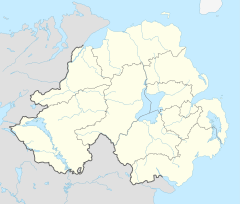Newtownstewart
| Newtownstewart | |
|---|---|
 Main Street in Newtownstewart | |
Location within Northern Ireland | |
| Population | 1,551 (2011 Census) |
| District | |
| County | |
| Country | Northern Ireland |
| Sovereign state | United Kingdom |
| Post town | OMAGH |
| Postcode district | BT78 |
| Police | Northern Ireland |
| Fire | Northern Ireland |
| Ambulance | Northern Ireland |
| UK Parliament | |
| NI Assembly | |
Newtownstewart is a village and townland of 540 acres (219 ha) in County Tyrone, Northern Ireland. It is overlooked by hills called Bessy Bell and Mary Gray and lies on the River Strule below the confluence with its tributary the Owenkillew. It is situated in the historic barony of Strabane Lower and the civil parish of Ardstraw.[2] In the 2011 Census it had a population of 1,551 people.[3] It lies within the Derry City and Strabane District Council area.[citation needed]
History



The townland of Newtownstewart was historically called Lislas. Newtownstewart Castle was built by Sir Robert Newcomen in 1615 as part of the Plantation of Ulster. The castle was acquired by Sir William Stewart when he married Newcommen's second daughter in 1629.[5][6] The castle and town were renamed Newtownstewart by Sir William Stewart after his birthplace.[1]
The former Northern Bank building on the corner was the scene of an infamous murder in 1871 when bank cashier William Glass was robbed of £1,600 and killed. Assistant District Inspector Thomas Hartley Montgomery, of the Royal Irish Constabulary, who was in charge of the investigation, was subsequently tried, convicted, and hanged at Omagh Gaol.[A]
Newtownstewart Town Hall, which was the venue for petty session hearings, was completed in 1880.[8]
Royal Visit
The Duke and Duchess of York visited the Duke of Abercorn at Baronscourt as part of their Royal Visit to Northern Ireland in 1924.[9]
Sport
Naomh Eoghan club is the local Gaelic Athletic Association club.[10]
Ardstraw Football Club is the local football club. The club participates in the Irish Cup.[11]
Demographics
On Census Day 27 March 2011, in Newtownstewart Settlement, considering the resident population:[3]
- 99.74% were from the white (including Irish Traveller) ethnic group;
- 52.87% belong to or were brought up in the Catholic religion and 45.84% belong to or were brought up in a 'Protestant and Other Christian (including Christian related)' religion; and
- 43.58% indicated that they had a British national identity, 25.53% had an Irish national identity and 33.33% had a Northern Irish national identity*.
- Respondents could indicate more than one national identity
Considering the population aged 3 years old and over:
- 11.82% had some knowledge of Irish;
- 7.59% had some knowledge of Ulster-Scots; and
- 1.68% did not have English as their first language.
People
- Thomas Burnside (1782–1851), member of the United States House of Representatives from Pennsylvania and associate justice of the Supreme Court of Pennsylvania, born near Newtownstewart.
- Thomas Maclear (1794–1879), Astronomer Royal at the Cape of Good Hope, was born in Newtownstewart.
- Dukes of Abercorn, reside at Baronscourt, near Newtownstewart[12]
- Johnny Loughrey, singer born in Newtownstewart in 1945, died in 2005.
- Jude Gallagher, amateur boxer, won multiple Irish Titles, World Youth Bronze and Commonwealth Games Featherweight Champion, 2022[citation needed]
- Jacob Stockdale, Ulster and Ireland rubgy player, was born in Newtownstewart.[13]
Transport
Construction of the Irish gauge (Irish Standard Gauge), Londonderry and Enniskillen Railway (L&ER) began in 1845 and reached Strabane in 1847. By 1852 it had extended to Newtownstewart and Omagh and its terminus in Enniskillen was reached in 1854. The company was absorbed into the Great Northern Railway (Ireland) in 1883.[14] Newtownstewart railway station opened on 9 May 1852 and finally closed on 15 February 1965.[15]
See also
Notes
References
- ^ a b "Placenames Database of Ireland". Archived from the original on 28 July 2019. Retrieved 28 July 2019.
- ^ "Townlands of County Tyrone". IreAtlas Townland Database. Archived from the original on 28 June 2015. Retrieved 10 April 2015.
- ^ a b "Census 2011 Population Statistics for Newtownstewart Settlement". Northern Ireland Statistics and Research Agency (NISRA). Archived from the original on 26 April 2021. Retrieved 25 April 2021.
 This article contains quotations from this source, which is available under the Open Government Licence v3.0 Archived 28 June 2017 at the Wayback Machine. © Crown copyright.
This article contains quotations from this source, which is available under the Open Government Licence v3.0 Archived 28 June 2017 at the Wayback Machine. © Crown copyright.
- ^ Morris 1870, p. [1]: between pages 50 and 51
- ^ "Newtownstewart Castle". Castles.nl. Retrieved 25 June 2022.
- ^ Meek, H.; Jope, E. M. (1958). "The Castle at Newtownstewart, Co. Tyrone". Ulster Journal of Archaeology. Ulster Archaeological Society. pp. 109–114. Retrieved 25 June 2022.
- ^ Radio Times (6 February 1939), Death at Newton-Stewart, vol. 62, BBC Television, p. 12
- ^ "7 Townhall Street, Newtownstewart, Co. Tyrone (HB10/04/045 B)". Department for Communities. Retrieved 25 June 2022.
- ^ "The Queen Mum in Ulster". Belfast Telegraph. 5 July 2008. Retrieved 25 June 2022.
- ^ "Tyrone's Naomh Eoghan club up and running". The Belfast Telegraph. 20 December 2019. Retrieved 6 April 2023.
- ^ Irish Cup 2012-13 Archived 2014-08-31 at the Wayback Machine
- ^ Morris, Francis Orpen (1870), A Series of Picturesque Views of Seats of Noblemen and Gentlemen of Great Britain and Ireland, vol. 4, London: William MacKenzie
- ^ "Jacob Stockdale on finding his self-belief, why family and faith are central to his life... And how his mum finally came around to his tattoo". Belfasttelegraph. Archived from the original on 26 September 2021. Retrieved 25 April 2021.
- ^ Patterson, Edward M (1962). The County Donegal Railways. Dawlish: David and Charles. pp. 10–11.
- ^ "Newtownstewart station" (PDF). Railscot – Irish Railways. Archived (PDF) from the original on 26 September 2007. Retrieved 22 November 2007.

